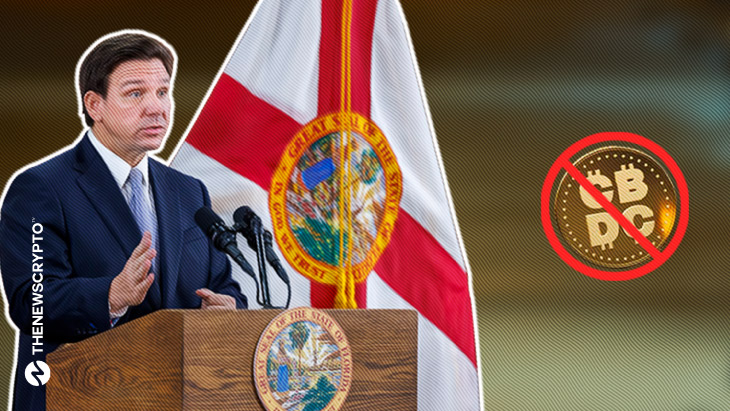- Legal experts challenge Florida’s CBDC ban as ineffective and misguided.
- Governor DeSantis’ fears of CBDCs are based on misinterpretation.
- Florida’s UCC-based approach hinders progress in the digital assets sector.
In a recent development, legal experts expressed worries over Florida’s move to outlaw central bank digital currency (CBDCs), questioning their usefulness and possible damage to the digital asset market. Despite Governor Ron DeSantis’s rhetoric that the restriction safeguards against government overreach and corporate surveillance, legal academics believe the bill fails to fulfill its stated goals.
The Florida statute, signed by Governor DeSantis on May 12, ostensibly restricts using a federally adopted CBDC by removing it from the definition of money in Florida’s Uniform Commercial Code (UCC).
However, legal experts contend that the statute does not technically prohibit CBDC usage in interstate commerce but rather classifies these assets as “general intangibles” under the UCC. Carla Reyes, an assistant professor at Southern Methodist University’s Dedman School of Law, emphasizes that the UCC has no authority to prohibit anyone from engaging in commerce.
DeSantis’ Motives and Misinterpretation of CBDCs are Being Scrutinized
Governor DeSantis’ resistance to CBDCs stems from his worries about a perceived power shift from individual customers to a central body. He claims that a digital currency would give the federal government enormous control over financial activities, perhaps leading to limitations on purchases such as weapons or fuel. Despite DeSantis’ statements, neither the US government nor any federal agency has formally declared an intention to issue a CBDC.
For the Federal Reserve to continue, the White House and Congress must both approve the implementation of the digital dollar. Furthermore, the Fed has no intention of being directly engaged in the retail CBDC industry, preferring to depend on banks and external digital wallets for transaction management.
Legal analysts argue that any future federal regulation on CBDCs would automatically overrule state law, leaving Florida’s prohibition moot. While DeSantis admits this possibility, it is worth noting that the Florida statute offers little substance to override in the first place since it simply puts CBDCs in a new category under the UCC.
Criticism of Florida’s Approach and Its Impact on the Digital Assets Sector
Legal experts say that Florida’s effort to use the UCC as a shield against digital currencies needs to revised and misrepresents the UCC’s objective. The UCC’s primary goal is to create rules for fundamental transactions and does not specify what may or cannot transferred.
Andrea Tosato, a legal expert at the University of Pennsylvania’s Carey Law School, claims that the Florida law’s application is inconsistent and lacks consistency. He criticizes the state’s action for undermining attempts to modernize the UCC about cryptocurrency and exaggerating the importance of the legal change.
While Florida seeks to modify its piece of the 50-state rules, it opposes suggested revisions to establish interstate regulations for cryptocurrency. These modifications might have laid the groundwork for using digital assets in commerce. While other states continue to implement similar modifications, Florida’s CBDC prohibition impedes progress.
In summary, legal experts criticize the efficacy and rationale of Florida’s CBDC prohibition, emphasizing that the legislation does not fulfill its stated purposes. Critics believe that the state’s effort to use the UCC as a weapon against digital currencies is deceptive and possibly damaging to the digital asset industry.








